Chris Loehmer Kincaid's Blog, page 5
July 16, 2025
Virginia I
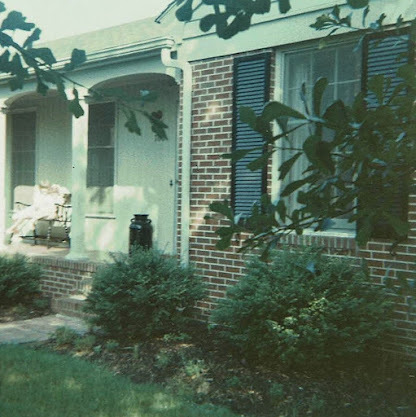
Journal of Our Journeys
Chapter 8 - Virginia I
Mymom's mom, born in 1893, was the oldest of nine children. One of her brothersdied at only eight months old, but several others lived relatively long lives. Onegreat-uncle beat out all of them, dying only two months shy of his 105thbirthday. He and his wife had been married for over 75 years when she passedaway at 94. And though they lived 1,200 miles away in a small papermill town inVirginia, we visited several times during my childhood.
Mom and Dad had been there with myother siblings, Tom and Judy, before. I have a black and white photograph ofTom and Judy on the veranda at Monticello, and another one with them, Mom, and arelative in someone's backyard, dated 1954. As I write this, I have justvisited Judy in the assisted living home where she now resides, and she showedme that same picture. I don't know how we each ended up with a copy of it, butthat's all right. Better to have too many photos than none.
It was a long ride in the camper toget to Virginia, driving through a few national parks and stopping at variouscampgrounds along the way. But once we pulled into their yard, we set up campright in their driveway. I never questioned why we couldn't sleep in theirhouse, but as a kid raised in the sixties, I didn't question much.
The homes of most of our relatives outEast were long and low to the ground, sprawling estates to my six-year-oldeyes. One great-aunt and great-uncle had a formal flower garden by the backdoor, a carport instead of a garage, a formal living room, and a formal diningroom, besides a family room. There was even a shed in the backyard where Uncle hada woodworking shop. That must be why he and Dad got along so well; Dad had asimilar shop in our garage.
But anyway, at that point in my life,I'd never been in a house with rooms that weren't used daily. Another great-uncleand his wife even had a fascinating room called a den. I don't remember muchabout it, except that it was down a couple of steps, the walls were paneled,the floor was covered in sculptured avocado-colored carpet, and taxidermedanimal heads were hanging on the walls. Okay, not so different from rooms inmany homes of the time, but it was still new to me.
One of my mom's cousins and herhusband rivaled that. They had a room above the garage for his train sets. Andthis was a grown man! He would stand in the middle of the room holdingthe controls and, with the push of a button, command trains to travel aroundthe room's perimeter.
The best thing about their house wasthat they had kids who were close to the ages of Pat and me. This meant thatinstead of spending our vacation days inside with the female adults, as theyshared tea and stories, we could be outside where our young cousins dared us tocurl up inside a tractor tire so they could roll us across the yard. Okay, Pataccepted the dare; I was too chicken to try it.
At night, we caught fireflies in apint jar in the backyard and then released them in their bedroom. With thelights on, the drab insects disappeared into the room's furnishings. When wethrew the room into darkness with the flip of a switch, the fireflies wouldappear as if by magic, bringing a glow to the room.
Mom's other cousin raised horses -trotters, actually - and lived in a restored plantation house. Riding up thelong driveway was like entering a different era. I always pictured ScarlettO'Hara walking out the front door, her wide hoop skirt sashaying. The interiorof the house seemed to go on and on and on, the formal dining room leading tothe formal living room leading to the family room, antiques everywhere. Sheeven had a housekeeper.
One year, when we were there, they hadjust finished building a new barn. This building had so many amenities – a fullkitchen, full bathroom, office, padded stalls for the horses. Nothing likebarns I’d been in back home.
The animal life at this farm was quitevaried. In addition to the beautiful sleek mares and their gangly foals, therewere several riding horses along with a small herd of round furry burros. Apair of Great Danes was offset by a pair of Welsh corgis, with their Germanshepherd-type heads and short, stubby legs.
Everywhere, exotic-looking peacocksroamed. In their occasional absence, their long, iridescent feathers or theirdroppings reminded me that they were still around. The birds would constantlyemit their loud cries, scaring those of us who had never lived with thesecreatures before.
The homes of the Virginia relativeswere awesome when I was just a naïve kid, but there were so many more wondersto witness throughout our great land.
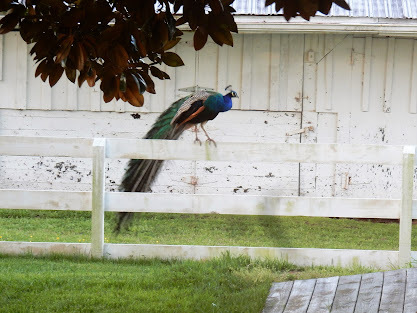 (The first picture is Pat and me on someone's porch in Virginia in 1968. You can barely make us out on the far right side. The picture just above is one the peacocks on the "Farm", when Hubby and I were there in 2019. A place full of memories.)
(The first picture is Pat and me on someone's porch in Virginia in 1968. You can barely make us out on the far right side. The picture just above is one the peacocks on the "Farm", when Hubby and I were there in 2019. A place full of memories.)July 13, 2025
Plant the Seed
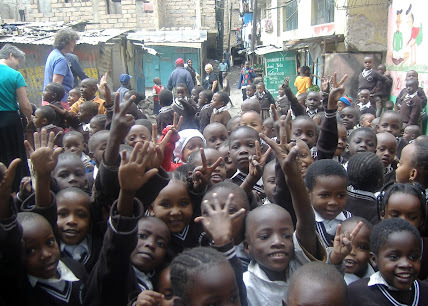
He went straight to the synagogues andbegan to preach that Jesus was the Son of God.
All who heard him were amazed and asked,“Isn't he the one who in Jerusalem was killing those who worship that manJesus? And didn't he come here for the very purpose of arresting those peopleand taking them back to the chief priests?”
But Saul's preaching became even morepowerful, and his proofs that Jesus was the Messiah were so convincing that theJews who lived in Damascus could not answer him. (Acts 9:20-22, Good NewsTranslation)
LastSunday I wrote about how Saul, who had been persecuting the early Christians,was called by God to spread the word of salvation through Jesus Christ. It wasan amazing conversion, and Saul (soon to be known as Paul) took off on hismission. He shared the story of Jesus with anyonewho would listen in city after city.
In the church at Antioch there were someprophets and teachers: Barnabas, Simeon, Lucius, Manaen, and Saul. While theywere serving the Lord and fasting, the Holy Spirit said to them, “Set apart forme Barnabas and Saul, to do the work to which I have called them.”
They fasted and prayed, placed their handson them, and sent them off. (Acts 13:1-3, GNT)
Hardto believe but just twenty years ago this weekend, I heard about a mission tripto Kenya, and one year later that trip to Africa changed my life. And hopefullychanged the lives of at least a few of the Kenyans I met. But it was nothing – Imean NOTHING – like what Paul experienced during the remainder of his lifetime.
Ican’t share with you here all the places Paul traveled to, all the people hemet, all the time he spent in prison. All the people he saved.
Butthat doesn’t mean we shouldn’t try. Just one person at a time. Show them the loveof Jesus Christ. Plant the seed. Watch it grow.
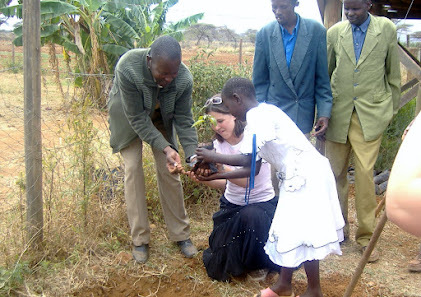 (The first picture is a group of school kids we encountered in one of the slums. The picture above is of one of our team members, Amanda, planting a tree with her Compassion child. I didn't imagine at the time that seven years later, I would be doing the same thing with my Compassion child in Kenya.)
(The first picture is a group of school kids we encountered in one of the slums. The picture above is of one of our team members, Amanda, planting a tree with her Compassion child. I didn't imagine at the time that seven years later, I would be doing the same thing with my Compassion child in Kenya.)
July 11, 2025
Home - My Brother, part 3
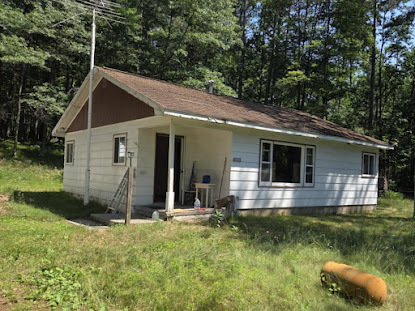
I wasn't going to write any more aboutmy brother – my mother would kill me for sharing all this personal stuff. Butas I mentioned here once before, if anything I say can give hope to someonegoing through the same nightmare, then it's worth the risk.
So, the big day to move my brotherinto assisted living was July 1. For two weeks, I mentioned it every time Ispoke with him on the phone, and he kept asking why he had to move out of hishouse for a couple of weeks and why it was going to take so long to fix hiswater. But we just kept telling him our little fib about it – that to clean upthe iron in his well water, it would take the plumber that long, and hewouldn't have any water that whole time, and it would even cause poisonousgases to come out his water faucets.
On the last day of June, he calledmultiple times, and I think it was starting to sink in. The morning of July 1,he called at least four times asking about it again. I told him I'd pick him upat 1:00 and that he could pack a bag with his electric razor, a change ofclothes, and anything else he might want to have over the next two weeks whilehe was there. He was agreeable to that.
Then, when I got to his house at 1:00, hehad made a 180 turn. He didn't know why I was there, and when I told him, hesaid he wasn't going to go. I kept telling him it would only be for a few weeksand reminded him that they would feed him three meals a day and he could watchTV all day on the big screen TV right outside his room. I also asked him if heremembered talking to me earlier and if he had packed anything to take withhim. But he just gave me a blank look.
He finally gave up on that argument andswitched to wanting to buy a new vehicle. We'd been telling him over the previousweek that they couldn't fix his truck and he couldn't get it back, so he'dbeen saying he was going to buy a new one and that I had taken him to thedealership the other day and he had put a down payment down on a truck and hewanted me to take him to pick it up.
My brain searched all over my head for astory. But I finally told him that we'd need to get him settled in his new roomfirst, and then we'd worry about picking up his new truck.
I got him in my car and talked again abouthow nice this place was as we drove to it.
I walked him into the building and to hisroom. He said, "oh, I remember coming here before."
We had bought him a throw for his bed,which had a big whitetail buck on it because he used to feed the deer. Theywere half-tame, almost eating out of his hand. He laughed when he saw that onhis bed and thought it was great.
I spoke with a few staff members and askedif I could run to get more of his things and if they could keep an eye on him.I parked him in front of the TV in the lobby, and he was fine when I left.
I met Hubby at his house so we could loadup his dresser, an end table, and the rest of his clothes. We looked for hisrazor, too, but couldn't find it. When we got back to the place, he was stillwatching TV, happy as a clam.
I could NOT believe it! Who was this man,and what had he done with my brother?
He called me a few times that evening,asking where he was and why, and I told him the same story. He'd say, "Oh,yeah," but then he'd still call back five minutes later.
Then he started calling me at one o'clockthe next morning. When I asked if he was okay, he answered, "Yes, I justcalled to talk." After the fourth time, I finally told him it was themiddle of the night, and I had to get some sleep, that he should put his phoneaway and go back to bed, and it would be morning before he knew it. I turnedoff my phone, and in the morning, I felt guilty because he had called threemore times. I'm sure he was scared, even though he wouldn't say that.
He still calls a few times a day, butmostly to tell me that he's been watching TV all day or that he just got doneeating a meal, but when I ask him, he doesn't remember what he ate, just saysthat it was good.
But he seems sooo happy. I still CANNOTbelieve it. Thank You, God, what did I ever do to deserve this huge blessing inmy life?
Through all this, the only time I gotteary-eyed was the day after we checked him in there, and Hubby and I weretrying to clean up stuff at his house. In his back room, I found a brown paperbag with some underwear, a pair of shorts, a handkerchief, and his razor. Hehad packed a bag for himself that morning and had forgotten all about it. Idon't know why that made me feel like crying - just that dementia is such ahorrible thing.
Yesterday, when I went in to see him, Isat down on the couch next to him where he was watching Jeopardy. He was sopleased to see me, and we had the best visit we have had in a year. I told himabout the different people I had talked to who wanted me to say "hi"to him. And he seemed to remember these people when I reminded him who theywere (two cousins and someone he went to school with).
He pointed to the sign on the door to hisroom, which had his name on it. He said the maintenance man wanted to removehis name, but he told the guy he was staying for two months, so he should leavehis name on the door.
Two months! We'd been telling him two tothree weeks. I don't know where this extended time came from. But he alsodidn't ask me today when he would be going home. Well, maybe he doesn't have toask anymore because I think he is home. And maybe he knows that, too.
I realize that he will probably still have bad days, that I might get phonecalls in the middle of the night or he might argue with me about somethingstupid. But I still thank God for the good days that he has had so far.
July 8, 2025
Chili, Hot Chocolate, and Fish
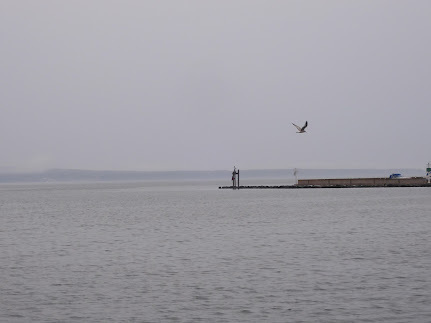
Journey of our Journeys
Chapter 7 - Chili, Hot Chocolate, and Fish
Smeltfishing each spring was an annual event for our family, rather like Christmasand the Fourth of July. If you have ever lived in the Northwoods, you will knowthat that does not make us strange at all; it means we fit right in.
There was no question that Dad would packus all in the camper one Friday afternoon as soon as he got home from work, andwe'd head to Ashland. We never knew exactly when until Dad heard from someonethat the smelt were running. But it was sometime in April or early May,depending on the length and severity of the winter, I suppose.
We usually stayed at a little city park inAshland, Wisconsin, along Lake Superior. We'd always get there after dark onFriday, so Pat and I would wake up amazed on Saturday morning to find ourselvesparked next to the greatest of the Great Lakes.
One year, we camped in a different park ina setting of green grass, pine trees, and a pond. Instead of being greeted bythe majesty of the Great Lake in the morning, we found a swan lazily paddlinglaps in the tiny lake. Not that it mattered to us; my sister and I were kidswho found everything amazing.
During the darkness of night, Dad and hiscronies from the paper mill where they all worked would wade out into LakeSuperior. Wearing chest-high waders, they would trudge with their nets into thefreezing water, then pull the nets back in full of hundreds of three- tosix-inch fish, many of their undersides bulging yellow with eggs.
Or at least that's what I picturedhappening. Since this all happened after dusk and it was invariably cold out,Mom was reluctant to release us from the camper. Someone usually lit a bonfire,though, and occasionally, Mom would let us out to bask in its heat.
The most vivid smelt-fishing incidentinvolved chili and hot chocolate. Pat and I were sitting at the table in thecamper, sipping hot chocolate with Kenny Venzke, the son of one of ourneighbors. Mom was at the stove heating a big kettle of chili so the men couldwarm their insides when they had finished freezing their outsides.
The camper was parked in its usual spot,far from shore, when suddenly it started moving. Well, we were all stuckinside. Remember the "no further than the edge of the back of the dinettewhen the truck is moving" rule? Even Mom was not immune to it. One lookthrough the camper's small window into the cab of the truck told her that Dadwas at the helm. We weren't being kidnapped or rolling out of control down somehill.
Mom was understandably vexed, but shewould ride it out and see what Dad had in mind.
Then, he drove over a set of railroadtracks. These were not ordinary railroad tracks that might be on a downtowncity street. These were hideous tracks, compact car-eating tracks. If ATVs hadbeen invented at the time, their drivers would have loved the challenge ofthese tracks.
Though we kids tightly clutched our cupsof cocoa, we could do nothing to prevent their contents from making a quickexit and spilling all over the table. Of course, that was nothing compared towhat happened to the chili.
Tomatoes, ground beef, sauce sloshed allover the stove, the back wall, the ceiling, Mom. You name it, there was chilieverywhere.
When the truck came to a complete stop ashort while later, Dad trotted around to the back door to sheepishly apologize.He had decided to drive down to the beach to be closer to the action. He didn'tknow that the railroad tracks were that rough.
Watching Dad's innocent face through theopen door of the camper, we waited with bated breath to hear what Mom would sayin her fury.
I don't remember what she said, maybenothing. Or perhaps it was one of those things so awful that our subconsciousburies the memory so we won't be haunted by it for the rest of our lives.
Whatever she said or did next, over the followingyear, she found more tomato sauce to wipe up every time we went camping.
(The picture is of Lake Superior at Ashland, taken when we were at a cabin up north in 2020. Not sure how close this was to where we camped coz things have changed so much up there in the past fifty-plus years.)
July 6, 2025
What Have You Been Called To Do?

Doyou remember where I left off last Sunday? Saul, who had been persecuting thefollowers of Jesus, had been struck blind on his way to Damascus.
Today,we’ll first meet Ananias, whom God had chosen to heal Saul’s blindness.
There was a believer in Damascus namedAnanias. He had a vision, in which the Lord said to him, “Ananias!”
“Here I am, Lord,” he answered.
The Lord said to him, “Get ready and go toStraight Street, and at the house of Judas ask for a man from Tarsus namedSaul. He is praying, and in a vision he has seen a man named Ananias come inand place his hands on him so that he might see again.”
Ananias answered, “Lord, many people havetold me about this man and about all the terrible things he has done to yourpeople in Jerusalem. And he has come to Damascus with authority from the chiefpriests to arrest all who worship you.”
The Lord said to him, “Go, because I havechosen him to serve me, to make my name known to Gentiles and kings and to thepeople of Israel. And I myself will show him all that he must suffer for mysake.”
Boy,I sure wish God would be that direct when He wants me to do something. Or maybenot.
It’seasy to ignore the little nudges you might feel when you’re wondering what todo in a certain situation. But when God calls your name and says, “Go” – well,we still tend to ignore Him or make excuses, don’t we? All I can do is pray forHis strength to do His will.
Butwhat happens next with Saul?
So Ananias went, entered the house whereSaul was, and placed his hands on him. “Brother Saul,” he said, “the Lord hassent me—Jesus himself, who appeared to you on the road as you were coming here.He sent me so that you might see again and be filled with the Holy Spirit.” Atonce something like fish scales fell from Saul's eyes, and he was able to seeagain. He stood up and was baptized; and after he had eaten, his strength cameback. (Acts 9:17-19, GNT)
Andthat was only the beginning for this man Saul, who would be known as theapostle Paul and go on to preach the Gospel to hundreds of people and write thirteenbooks of the Bible.
Whenwe think about what God called Ananias to do, his assignment was much less thanPaul’s. God called Paul to totally turn his life around, accept Jesus as hisone true Savior, and share his testimony everywhere he went.
Whathas God called you to do?
July 2, 2025
Warmth One Winter
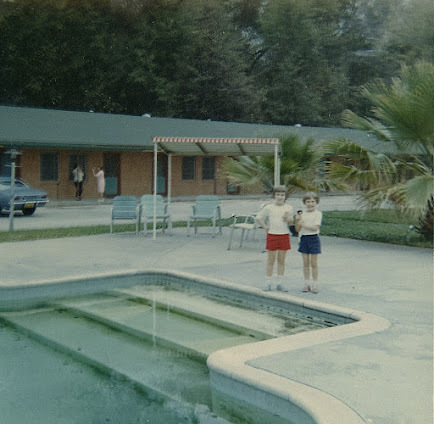
Journey of our Journeys
Chapter 6 - Warmth One Winter
Shortlyafter my parents married in 1945, my dad got a job at the Owens-Illinois papermill. At the time, it was by far the best place to work in our town. The paywas good, and the work was steady, even if it was noisy and smelly.
Dad worked in the maintenance department, so he wasn’t stuck with the swingshift like many others. Instead, he clocked in from 7:30 a.m. to 4:00 p.m.,Monday through Friday. He did have to take call, though, so he would go intowork in the middle of the night or on weekends if a piece of machinery neededemergency care.
This also meant that if needed, he would travel across the country to one ofthe other mills owned by Owens-Illinois.
Years before I was a twinkle in his eye, my father worked for an extendedperiod of time at the Valdosta, Georgia, mill. Mom, Tom, and Judy went withhim, living in company housing and dealing with the joys of submitting theirnorthern-born bodies to the hot, humid, bug- and snake-infested south.
Near the end of October 1967, Dad and some of the guys from his crew wereneeded at the mill in Orange, Texas. What a paper mill was doing there, alongthe Gulf of Mexico, was a mystery to me – and still is. Isn’t Texas a stateknown for ranches and wide-open spaces? Where do the trees that are needed tomake paper come from?
In any event, Dad took the camper to Texas with Tom Allory, Red Wurl, and a fewothers. When they got to Portage, Wisconsin, Dad took a wrong turn. Instead ofcrossing the Wisconsin River at the new Highway 51 bridge, he took the Merrimacferry. Although there are 1,200 miles of dry land between home and Orange, wewould always mention how Dad took the ferry there.
At some point during his absence, Mom packed up Pat, me, a lady named Mrs.Lane, and two young men in the military and drove to Texas for a few weeks. Forsome reason, we left at four o’clock in the morning. It was pitch black outsideand freezing cold that November.
We arrived in Texas the next day to a warmth we never dreamed of in November.We were amazed that we could go outside without jackets or scarves. The motelwhere we stayed had an outdoor pool, which was still in use. Of course, Momwouldn’t let us use it, but no decent mother of the time would let theirchildren go swimming outdoors in November, no matter what the weather or whereyou were.
Our jaunt to the Gulf of Mexico was rather chilly, more seasonable for us, witha stiff breeze coming off the ocean. Mom made us wear our jackets and scarves.Our plaid cotton scarves, with fringes, were almost extensions of ourselves, tobe worn at all times unless the weather was extreme. Extreme cold was what wehad left behind in Wisconsin that November, requiring a home-knit cap pulleddown around our ears. Extreme heat was the month of July, those four weeksduring the Wisconsin summer when the temperature consistently stayed above 45degrees.
Two of the souvenirs we brought home were silky scarves with a picture of theLone Star State printed on them. Pat’s had blue trim, mine red. Mine is stillat the bottom of one of my dresser drawers, threadbare and wrinkled, but stillbearing the Texas logo.
The other item I remember Mom purchasing was a play cowboy whip for my16-year-old cousin. I cannot fathom why she thought that was an appropriategift. As soon as she gave it to him, he chased Pat and me around my aunt’s yardwith it.
Free souvenirs are sometimes the best. Dozens of seashells found their way intothe camper only after Mom had inspected them to ensure no animals were lurkinginside.
“You know that animals do live inside those shells, don’t you?”
“Yes, Mom,” we obediently answered and immediately thought, “Wouldn’t it becool if one of those animals made it all the way home before crawling out whenwe took the shell to school for show-and-tell?”
We really wanted to take the jellyfish to school. We found one washed up on thebeach, its long transparent tentacles trailing into the ocean. It waspositively unearthly.
“Get away from that thing,” Mom shouted before we could get within ten yards.“That thing is poisonous.”
“But Mom, it’s dead.”
“It doesn’t matter. It is still poisonous and can still sting you.”
So much for extraordinary wildlife.
Dad packed us up in early December, and we headed home together in the camper,stopping at the Astrodome on the way. It was the eighth wonder of the world atthe time, a mechanical feat of engineering ingenuity. Opened in April 1965, itwas still new when we visited it two years later. And for many years, it wasone of a kind—a structure to rival the pyramids of Giza. Even the Astroturf wasawe-inspiring. Over the last twenty years or so, the space had become archaic and fell into disrepair.
The only thing good about returning home to the frozen tundra was that I got toshow off all sorts of neat stuff to my kindergarten class.
June 29, 2025
What Happened to Saul
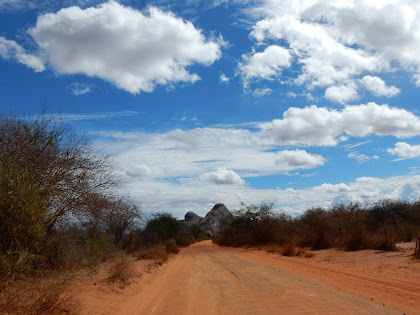
In the meantime Saul kept up his violentthreats of murder against the followers of the Lord. He went to the High Priestand asked for letters of introduction to the synagogues in Damascus, so that ifhe should find there any followers of the Way of the Lord, he would be able toarrest them, both men and women, and bring them back to Jerusalem.
Inlast Sunday’s blog post, I mentioned a guy named Saul. He was born between 5 BCand 5 AD to a devout Jewish family in the area of Tarsus and was a Romancitizen by birth. He was well-educated in Jewish law but became a tentmaker bytrade.
Asbelief in Jesus as the Messiah spread through his area, Saul, along with manyother Jewish leaders, began chasing down these new believers. They harassed,arrested, and tortured the men and women who attested that Jesus Christ wastheir Savior.
Andthen something happened.
As Saul was coming near the city ofDamascus, suddenly a light from the sky flashed around him. He fell to theground and heard a voice saying to him, “Saul, Saul! Why do you persecute me?”
“Who are you, Lord?” he asked.
“I am Jesus, whom you persecute,” thevoice said. “But get up and go into the city, where you will be told what youmust do.”
The men who were traveling with Saul hadstopped, not saying a word; they heard the voice but could not see anyone. Saulgot up from the ground and opened his eyes, but could not see a thing. So theytook him by the hand and led him into Damascus. For three days he was not ableto see, and during that time he did not eat or drink anything. (Acts 9:3-9, GoodNews Translation)
Ifyou are familiar with the Christian faith, there is a very good chance that youknow how this story ends. But let’s stop here for a minute and pretend we areviewing this cliffhanger for the first time.
Whatwould be going through your mind if you were Saul and were suddenly blinded? Ifa voice without a body was speaking to you, asking you what you were doing andwhy you were doing it? If the voice answered that He was the One who Hisfollowers believed in? And you remained blind and didn’t eat or drink for threedays? What would you believe?
(The picture above is from my third trip to Kenya, in 2015. Maybe the road to Damascus looked a little bit like that.)
June 27, 2025
My Brother, Part 2
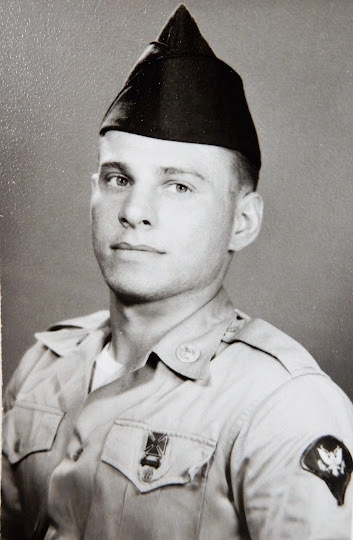
Last Friday, I shared with you the sadstory of what my brother’s life is like now. And on Wednesday, I alluded to histime in the service. Here is the rest of that story.
My brother, Tom, served in the US Armyfrom 1965 to 1967. As you may have read in my post from earlier this week, wedrove to New York in June 1967 to visit him when he was stationed at WestPoint.
Somehow, he dodged the bullet which tookso many others to Vietnam. But before his cushy job as an MP at the militaryacademy, he was dispatched to the Dominican Republic, where he did dodgebullets.
Ever since I could remember, the onlymilitary conflict I heard about my entire childhood was the war in Vietnam. Butother places in the world were also embroiled in tension.
The Caribbean paradise of the DominicanRepublic was a mess for many years. From 1930 to 1961, it was ruled by aruthless dictator who used repression, torture, and murder to keep the massesin line. When this guy was assassinated in 1961, you would think things wouldsettle down, but not when his son and other relatives tried to keep control.After several coups and many deaths, the US deployed troops to the island inApril 1965 to keep the peace.
And my brother showed up early thefollowing year. His role was that of a driver; whether driving militarydignitaries around or picking up the payroll at the airport, it was the job ofTom and his partner to get it done.
As Tom has told the story, one time, theypicked up the payroll and were driving back to base with it. The payroll wasall in cash, in American dollars, so that the servicemen would have quickaccess to it. Also, I thought all military bases had their own airport, but inthis case, the airport where they picked up the payroll was several miles away.
As they drove out of the airport in theirJeep, local rebels started following them. They could only assume it wasbecause the rebels knew what they were carrying. When these guys with machineguns began shooting at them, their assumptions proved to be correct.
I don’t remember if Tom ever said who wasbehind the wheel, but one of them drove like a madman back to base while theother kept firing rounds at their pursuers.
They made it safely back to base, and theheavy chain-link gate slamming shut behind them was music to their ears.
Tom even got a commendation for it. Maybehe didn’t serve his country in Vietnam or fight to keep the communists at bay,but he still served the men and women on that base, all of them, just doingtheir jobs in the name of freedom for someone.
But what is heartbreaking is that we had to take away his truck to keep him from ever drivingagain.
June 25, 2025
A Really Big Waterfalls
Here we are on Chapter 5 of my Journal of our Journeys. Unfortunately, I don't have any pictures of the really big waterfall from that trip. This snapshot of my favorite falls, O-Kun-de-Kun, will have to do.
 Thefirst big trip we took in the new camper was to New York State. We visited mybrother Tom, who was stationed as an MP at West Point, and then we went to seeNiagara Falls. It was June 1967. I never realized until many years later howclose this journey took us to New York City.
Thefirst big trip we took in the new camper was to New York State. We visited mybrother Tom, who was stationed as an MP at West Point, and then we went to seeNiagara Falls. It was June 1967. I never realized until many years later howclose this journey took us to New York City.As a kid, I was wildly in love with the TrixieBeldon mystery series. I thought the coolest thing would be to livewhere the Beldons, Wheelers, and all their friends lived in the Hudson Valleynorth of the Big Apple. I never knew that I had actually been through the areawhere my childhood fictitious heroine lived. I’m sure this information wouldhave freaked me out when I was twelve and reading about another girl’sadventures. Now, I’m just amazed that I was that geographically challenged.Didn’t my parents ever show me an atlas?
Anyway, the trip took us through Indiana,Ohio, and Pennsylvania. I remember next to nothing of West Point and absolutelynothing of my brother’s role there. He was 21; I was just a kid, a punk, noteven in kindergarten.
A lifetime later, when I mentioned it tomy husband, he was impressed that my brother had gone to West Point. I hadnever thought much about it. So what? Tom was at the prestigious militaryacademy. As a kid, I didn’t know what West Point was and never thought moreabout it.
Well, no, he wasn’t a cadet there.Heavens, no. He’d been sent to Fort Bragg for basic training and then to theDominican Republic to drive around important officers and deliver the payroll.From there, he worked for the military police on the West Point campus.
But I knew none of that at the time.
I do remember Niagara Falls, though. I canstill hear the thunder of millions of gallons of water rushing over the edge ofrock eons old. The ground underfoot shook from the power of it. I can see thelights they turned on at night, illuminating the falls in a rainbow of color.
Dad took my sister Pat on a trip under thefalls; I was too little to go. The story of my life was being left behind withMom while Pat did something cool with Dad. Pat was all excited about it, butshe never admitted until 20 years later that it had scared the wits out of her.
We returned via Canada, crossing intoOntario at Niagara Falls and coming back through Michigan and its UpperPeninsula.
It became a quest during the 1980s and1990s for my sisters and me to visit every waterfall within a two-hundred-mileradius of where we lived. Even the tiniest trickle of water tumbling downstreamwas a fascination and a photo op. The smaller waterfalls were usually thebetter ones, with fewer people, often no people, just lots of peace andstillness, except for the hypnotic sound of water. If we had to climb atreacherous trail or slide down a slippery slope to get to that waterfall, allthe better. We were always game.
Niagara Falls was certainly the biggestwaterfall I’ve ever seen, but would I return there? With all the congestion andcommercialism? I will take a ten-foot waterfall in the woods in the middle ofnowhere. But the passion of it all may have begun for me at that New York statetourist trap.
June 22, 2025
The Martyring of Stephen
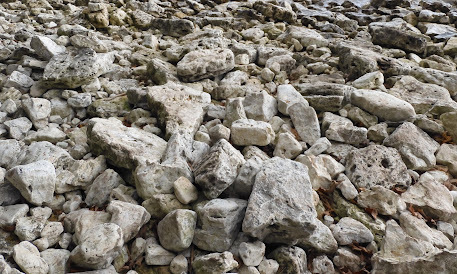
Stephen, a man full of God’s grace andpower, performed amazing miracles and signs among the people. But one day somemen started to debate with him. They were Jews from Cyrene, Alexandria,Cilicia, and the province of Asia. None of them could stand against the wisdomand the Spirit with which Stephen spoke. (Acts 7:8-10, New Living Translation)
AfterStephen shared with these men about their Jewish heritage, from Abraham toMoses to David, he finished with the following verses.
“You stubborn people! You are heathen atheart and deaf to the truth. Must you forever resist the Holy Spirit? That’swhat your ancestors did, and so do you! Name one prophet your ancestors didn’tpersecute! They even killed the ones who predicted the coming of the RighteousOne—the Messiah whom you betrayed and murdered. You deliberately disobeyedGod’s law, even though you received it from the hands of angels,” Stephen said.(Acts 7:51-53, NLT)
Andthis was their reaction.
The Jewish leaders were infuriated byStephen’s accusation, and they shook their fists at him in rage. But Stephen,full of the Holy Spirit, gazed steadily into heaven and saw the glory of God,and he saw Jesus standing in the place of honor at God’s right hand. And hetold them, “Look, I see the heavens opened and the Son of Man standing in theplace of honor at God’s right hand!”
Then they put their hands over their earsand began shouting. They rushed at him and dragged him out of the city andbegan to stone him. His accusers took off their coats and laid them at the feetof a young man named Saul.
As they stoned him, Stephen prayed,“Lord Jesus, receive my spirit.” He fell to his knees, shouting, “Lord, don’tcharge them with this sin!” And with that, he died. (Acts 7:54-60, NLT)
Beingstoned to death must have been horrific. I can’t imagine how terrifying andpainful, but Stephen’s faith did not waver. Could any of us continue to testifythat Jesus is our Savior as we fell to our death?
Stephenwas the first of many believers to be martyred in the Bible, and many morewould follow, many at the hands of this man Saul. Do you remember him? And whohe became?
Saul was one of the witnesses, and heagreed completely with the killing of Stephen.
A great wave of persecution began thatday, sweeping over the church in Jerusalem; and all the believers except theapostles were scattered through the regions of Judea and Samaria. (Some devoutmen came and buried Stephen with great mourning.) But Saul was going everywhereto destroy the church. He went from house to house, dragging out both men andwomen to throw them into prison. (Acts 8:1-3, NLT)
Hopefullyyou’ve already heard of this guy Saul, and if not, you can read about himhere next week.



